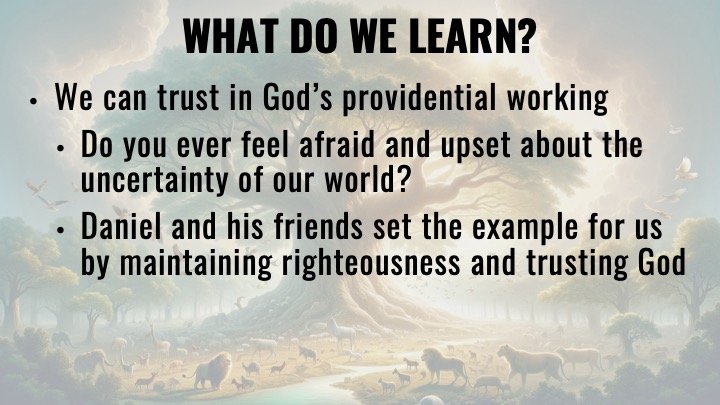God’s Humbling Hand (Daniel 4)
The Dream
As we open our Bibles to Daniel Chapter 4, we're about to embark on a journey into one of the most remarkable stories of the Bible - a tale that reveals the power of God over the mightiest of kings. This isn't just any story; it's the personal testimony of King Nebuchadnezzar, a man who experienced firsthand the power of God.
Imagine the grandeur of Babylon, a city of splendor and might under Nebuchadnezzar's rule. The hanging gardens, one of the wonders of the world, the towering ziggurats touching the sky, streets bustling with traders from distant lands - this was Nebuchadnezzar's kingdom, his pride and joy.
One night, amidst this opulence, Nebuchadnezzar was troubled by a dream. The king, accustomed to having his way, was shaken. His sleep left him, his mind raced, and his heart pounded with an unexplainable fear. He called for his wise men, the magicians and astrologers, yet none could unfold the mystery of his dream. It was a riddle, a puzzle that only a revelation of God could answer.
So the king calls for Daniel, a man of God, known for his wisdom and connection to the God. As Nebuchadnezzar recounts his dream to Daniel, we can almost feel the king's desperation. He speaks of a tree, magnificent and towering, visible to the ends of the earth, a source of shelter and sustenance for all the birds, animals, and creeping things. But then, a heavenly decree is issued – chop down the tree, strip its branches, scatter its fruit, but leave the stump bound with iron and bronze. But that’s not all. The voice said, “Let his mind be changed from a man’s, and let a beast’s mind be given to him; and let seven periods of time pass over him. 17 The sentence is by the decree of the watchers, the decision by the word of the holy ones, to the end that the living may know that the Most High rules the kingdom of men and gives it to whom he will and sets over it the lowliest of men” (4:16-17)
As Nebuchadnezzar watches Daniel's reaction, there's a palpable tension. Daniel, the servant of the Most High, is visibly troubled. The king senses that this dream is no ordinary vision but a divine message, a warning from the heavens. The king urges Daniel to speak, to reveal the meaning of this perplexing vision.
And at this moment, we pause. One more time, we remember that Nebuchadnezzar, the great king, cannot force anything to happen. Everything is ultimately out of his control. It's a moment that reminds us that only God is sovereign. He alone has power to speak into the lives of rulers and nations like this.
The Interpretation
Daniel finally reveals the interpretation: With bated breath, the court of Nebuchadnezzar waits. The air is heavy with anticipation as Daniel, known as Belteshazzar in Babylon, prepares to unveil the meaning of the king's mysterious dream.
Notice the demeanor of Daniel - respectful, yet unwavering. He is not harsh, condescending, or mean. He even pauses, wishing the dream were for the king's enemies, not for Nebuchadnezzar himself. This isn't just tact; it's genuine compassion. Daniel, even in his position of power, remains a servant of God, respectful to the king but loyal to the truth.
Daniel begins to interpret: The great tree, tall and strong, is you Nebuchadnezzar. The king, towering over the kingdoms of the earth, providing shelter and sustenance to his people. But then comes the divine decree: You will be cut down, humbled, stripped of your glory until you recognizes that the Most High rules over the kingdoms of men. The king will lose his mind, living like a beast until he lifts his eyes to heaven and acknowledges God's sovereignty.
In a bold move, Daniel advises the king to repent, to break off his sins by practicing righteousness and showing mercy to the oppressed. It's a call for transformation, an appeal to the king's conscience to avert the impending judgment.
As Daniel concludes, we can almost hear the silence in the hall. The king, the mighty ruler of Babylon, faces a crossroad. Will he heed the warning, or will his pride lead him to downfall? This is a moment of truth, not just for Nebuchadnezzar but for all who hear this story.
The King's Fall (Daniel 4:28-37)
We find out that King Nebuchadnezzar did repent, for a time. His transformation lasted about a year. He paid his penance, but God doesn’t work like that. He’s not interested in penance. God wants a total heart transformation.
The scene shifts to a year later, when we find Nebuchadnezzar, walking on the roof of his royal palace, gazing out over Babylon. In a moment of blinding pride, he boasts, "Is not this great Babylon, which I have built by my mighty power as a royal residence and for the glory of my majesty?" It's a statement dripping with arrogance, a declaration of self-sufficiency that echoes in the heavens. God knows what came out of his mouth. He knew it was in his heart.
As the words leave his mouth, a voice thunders from heaven, "O King Nebuchadnezzar, to you it is spoken: The kingdom has departed from you." The judgment is swift and immediate. The king's sanity is stripped from him, and he is driven from men. Nebuchadnezzar becomes like a beast of the field, his body drenched with the dew of heaven, his mind lost to animalistic instincts.
For seven long times (whatever a time is), Nebuchadnezzar dwells among the beasts. His hair grows like eagles' feathers, his nails like birds' claws. It's a humbling, almost unimaginable transformation. The most powerful man on earth, reduced to the lowliest of states. It's a vivid illustration of God's sovereignty over the proud, a stark reminder that no one is beyond the reach of His humbling hand.
But this story isn't just about judgment; it's about restoration. At the end of the appointed time, Nebuchadnezzar lifts his eyes to heaven. His sanity returns, and with it, a profound realization. He praises and honors the Most High, acknowledging His eternal kingdom and dominion. Nebuchadnezzar is restored to his throne, but he's a changed man. He now knows that those who walk in pride, God is able to humble.
As we move towards the conclusion of this incredible narrative, we're reminded of the transformative power of God's discipline. Nebuchadnezzar's story is a testament to God's desire not just to humble, but to restore and redeem. It's a story that challenges us to examine our own hearts, to recognize God's sovereignty, and to respond with humility and obedience.
Applications and Conclusion
As we conclude our journey through Daniel Chapter 4, we arrive at the heart of our reflection - the application of Nebuchadnezzar's story to our lives and the powerful message it conveys about God's sovereignty.
1. Recognizing God's Sovereignty (Daniel 4:17):
Daniel 4:17 (ESV) — 17 The sentence is by the decree of the watchers, the decision by the word of the holy ones, to the end that the living may know that the Most High rules the kingdom of men and gives it to whom he will and sets over it the lowliest of men.’
Central to this chapter is verse 17, which stands as a monumental truth: "The Most High rules in the kingdom of men and gives it to whom He will." This isn't just a statement about ancient kings; it's a timeless truth about God's authority over all rulers, all nations, all epochs. As we approach another election cycle, let's remember this: it's not the politicians, the pundits, or the polls that ultimately decide the course of history, but God Himself. This understanding should bring us peace and confidence, shifting our focus from human schemes to divine sovereignty.
2. The Danger of Pride:
Nebuchadnezzar's fall is a stark reminder of the perils of pride. Pride blinds us, making us believe we are the architects of our success, forgetting God's role in our lives. It's a trap that can ensnare anyone, from the mightiest king to the humblest believer. Let us then examine our hearts, asking God to reveal and uproot any seeds of pride. He removes the proud and exalts the humble.
3. The Power of Humility and Repentance:
Nebuchadnezzar's restoration began when he acknowledged God's sovereignty. It's a powerful lesson in humility and repentance. Humility isn't weakness; it's the strength to recognize our dependence on God. Repentance isn't just feeling sorry; it's a transformative turning back to God. As we face our challenges, may we do so with a humble heart and a repentant spirit.
4. Trusting in God's Providential Working:
As believers, we are called to trust in God's providential working in our lives and in the world. Our circumstances, whether in triumph or trial, are within His control. Let this truth anchor our souls, especially in times of uncertainty and change.
Conclusion:
In the grand narrative of Scripture, Nebuchadnezzar's story is more than a historical account; it's a vivid demonstration of God's power to humble the proud and to exalt the humble. As we leave today, let's carry with us the awe-inspiring reality of God's sovereignty, a renewed sense of humility, and an unshakeable trust in His providential plan. Let's step into the world not swayed by the winds of news and opinion, but grounded in the eternal truth of God's Word. And as we do, may our lives reflect the glory of a God who is, indeed, ruler over the kingdoms of men, guiding history according to His perfect will.













